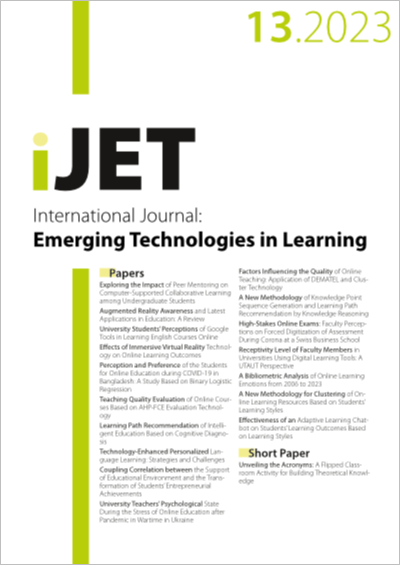Effects of Immersive Virtual Reality Technology on Online Learning Outcomes
DOI:
https://doi.org/10.3991/ijet.v18i13.41201Keywords:
immersive virtual reality, online learning, learning outcome, questionnaire technology, analysis of varianceAbstract
In the digital information era, such information technologies (ITs) as the Internet, big data, artificial intelligence (AI), and virtual reality (VR) are changing people’s production and lifestyle. Moreover, ITs have exerted significant influences on the thinking modes and learning styles of people. On the bases of such characteristics as sensory immersion, roaming, and manipulation, immersive VR (IVR) can support learners to pursue contextualized learning, promote their embodied cognition, improve their emotional experience, and solve problems of traditional classrooms, such as poor interaction, poor contextualization, and unreal immersion. This study used existing associated research as basis in analyzing the influences of IVR factors on degree of concentration, sense of traversing, emotional engagement, and sense of enjoyment on online learning outcome. Moreover, differences in learning outcomes under different contact periods IVR technology were analyzed. Research results are as follows. The overall Cronbach’s α, KMO value, and P value of the questionnaire are 0.905, 0.870, and 0.01, respectively. Degree of concentration, emotional engagement, and sense of enjoyment of IVR technology can promote online learning outcome significantly. Contact period with IVR technology has significant influences on learning outcome at the 0.01 level (F=3.895, p=0.009). Lastly, research conclusions provide important references in exploring the complicated relationship between sense of immersion and learning outcome in IVR environment, and in improving emotional experience and knowledge transfer based on IVR technology.
Downloads
Published
How to Cite
Issue
Section
License
Copyright (c) 2023 Yunru Liao

This work is licensed under a Creative Commons Attribution 4.0 International License.


